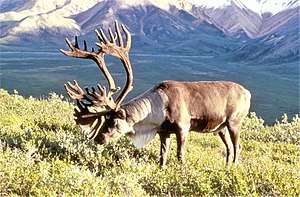reindeer
English

a reindeer (Rangifer tarandus)
Etymology
From Middle English [Term?], from Old Norse hreindýri (“reindeer”), from hreinn + dýr (“animal”).
Pronunciation
- (Received Pronunciation) IPA(key): /ˈɹeɪndɪə/
- (General American) IPA(key): /ˈɹeɪndɪɹ/
Audio (GA) (file) - Hyphenation: rein‧deer
Noun
reindeer (plural reindeers or reindeer)
- An Arctic and subarctic-dwelling deer of the species Rangifer tarandus, with a number of subspecies.
- 1768, D[aniel] Fenning, “LAPLAND”, in The Royal English Dictionary; or, A Treasury of the English Language, 3rd improved edition, London: Printed for R. Baldwin, Hawes and Co., T. Caslon, S. Crowder, J. Johnson, Wilson and Fell, Robinson and Roberts, and B. Collins, OCLC 22419759:
- Here is a prodigious number of wild beaſts, as ſtags, bears, wolves, foxes of various colours, martens, hares, glittens, beavers, otters, elk, and rein deer: the latter is leſs than a stag.
- 2013 March, Nancy Langston, “Mining the Boreal North”, in American Scientist, volume 101, number 2, archived from the original on 13 April 2016, page 98:
- Reindeer are well suited to the taiga’s frigid winters. They can maintain a thermogradient between body core and the environment of up to 100 degrees, in part because of insulation provided by their fur, and in part because of counter-current vascular heat exchange systems in their legs and nasal passages.
-
Hyponyms
Derived terms
- arctic reindeer
- Finnish forest reindeer
- mountain reindeer
- reindeer calf
- reindeer lichen
- reindeer moss
- Siberian forest reindeer
- Siberian reindeer
- Svalbard reindeer
- wild reindeer
Translations
Rangifer tarandus
|
|
This article is issued from
Wiktionary.
The text is licensed under Creative
Commons - Attribution - Sharealike.
Additional terms may apply for the media files.